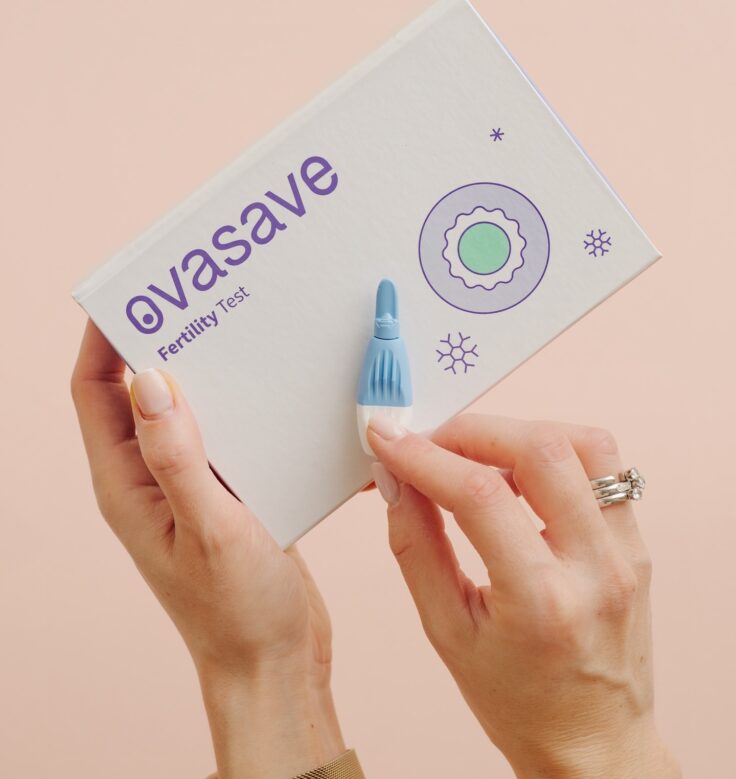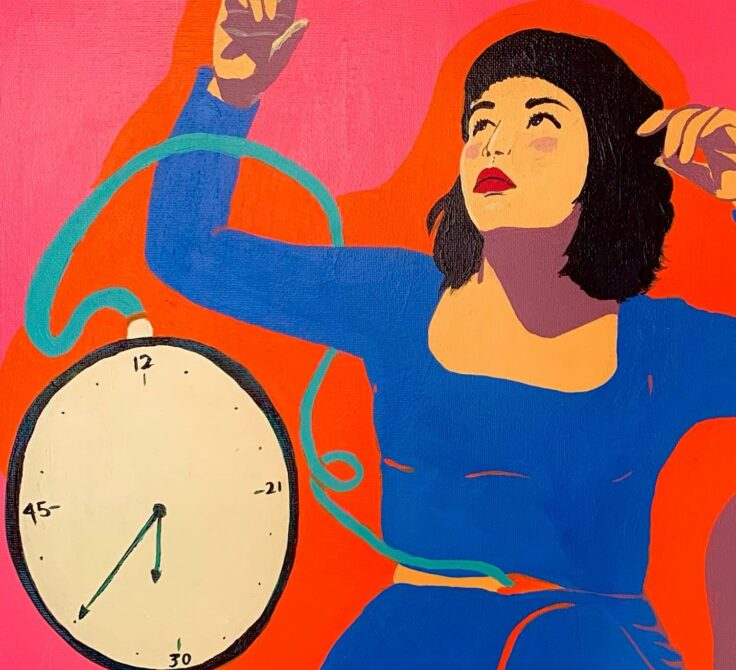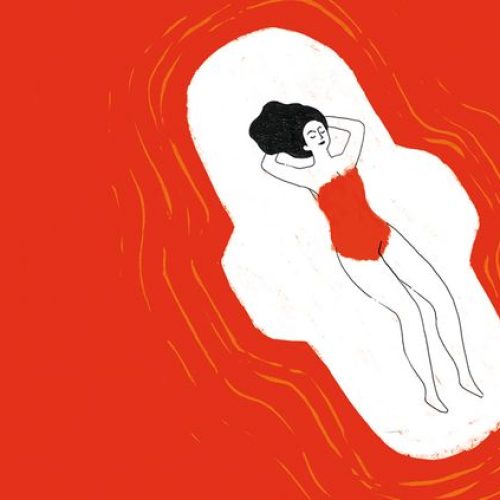In our region, the topic of fertility is often relegated to whispered conversations hidden behind the folds of restaurant menus, but Torkia Mahloul is determined to break through the silence. The French-Arab entrepreneur’s foray into fertility preservation began with a simple yet profound realization: the process was complex, pricey, and shrouded in ambiguity. As a woman in her thirties grappling with the weight of time ticking away, she decided to create Ovasave, a groundbreaking online fertility platform changing the landscape of fertility screening and egg freezing in the UAE, while dismantling the stigma often associated with it. “At 34, I realized time was ticking if I wanted to freeze my eggs,” Mahloul shared with MILLE. “Going through multiple rounds of egg freezing was tough– the process was complex, pricey, and hard to navigate. It struck me that countless women like me were traversing their reproductive years without truly understanding their bodies, hormones, or options for preserving fertility. That’s when I knew I wanted to make a change. I set out to simplify and make fertility screening and egg freezing more accessible and affordable for women everywhere,” she added.
At the heart of Ovasave lies a simple yet powerful conviction: the fertility conversation needs to happen. “Similar to other topics concerning women’s bodies like periods, menopause, and postpartum feelings, fertility remains a taboo subject,” Mahloul said. “Society tends to encourage women to keep these discussions private, or worse, avoid them altogether. I recall my mom urging me to keep my egg freezing journey under wraps (sorry, Mom!) This silence around fertility, whether in schools, workplaces, or homes, means many women miss out on essential education about their bodies,” she continued.
By fostering safe spaces both online and offline, Ovasave is empowering women to take charge of their reproductive health. Too often, women find themselves adrift in a sea of misconceptions, unaware of fundamental concepts like AMH testing and its implications. Ovasave’s mission is to disseminate accurate information and ensure that every woman is equipped with the knowledge to make informed decisions about her fertility. “Every day, I encounter women who are unaware of fundamental concepts like AMH testing and its significance. The core of our message isn’t about pushing all women to freeze their eggs, it’s about ensuring that every woman has access to information and choices regarding her reproductive health,” explained Mahloul.
Through collaborations with corporates, communities, clinics, and individuals, Ovasave is reshaping the fertility landscape, one informed choice at a time. At the heart of Ovasave’s offerings lies the AMH test, an easy tool that provides insights into ovarian reserve. This simple yet powerful test empowers women to understand their fertility health better, paving the way for informed decisions about their reproductive futures. By offering convenient at-home testing, Ovasave ensures that access to fertility screening is no longer a luxury but a fundamental right.

“It is important first to recall that women are born with all the eggs they will ever have, typically around 1 million, which gradually diminish throughout their lives until menopause. AMH, or Anti-Müllerian Hormone, is a hormone produced by the ovaries that tells us about the quantity of eggs a woman has left,” she explains. “You can think of it as a marker for a woman’s ovarian reserve, which means the number of eggs she has available for fertilization. If a woman has a higher AMH level, it usually means she has more eggs left, while a lower level may indicate a smaller egg reserve.”
An AMH test is considered the most accurate tool for assessing ovarian reserve, providing valuable insights into a woman’s fertility potential. However, while AMH tests are helpful to understand your future fertility potential, they don’t tell you everything about your chances of getting pregnant. Fertility depends on lots of factors, like how old you are, your health, lifestyle, and whether you’ve had kids before. “When it comes to egg quantity, there’s not much we can do to prevent our bodies from losing eggs as we age,” Mahloul revealed. “However, being aware of your hormonal health through tests like the AMH test can help identify potential issues early on. By understanding your ovarian reserve and hormonal balance, you can take proactive steps to preserve your fertility and address any underlying conditions that may affect it,” she added.
Ovasave’s at-home AMH testing kit, which you can order online for AED 350, comes equipped with a test strip, two finger-pricking tools, two alcohol swabs, two bandaids, gauze, a blood sample return bag, and easy-to-follow instructions. How it works is pretty straight-forward: After you take your blood sample according to the instructions in the package, you place it in the return bag and a designated individual will collect it from your home and send it to a laboratory. The laboratory then examines the sample and has the result evaluated by a doctor before it is communicated to you online within five-days. The test is 100% safe, and there’s minimal preparation required, although Mahloul recommends you stay hydrated throughout the day of testing, and wash your hands with warm water before pricking your finger to enhance blood circulation. Alternatively, there is also an option to schedule a visit from a phlebotomist instead, who will come to your home and collect your blood sample intravenously.
The AMH test is beneficial for any woman who wants to gain insights into her fertility health. “It’s particularly relevant for women who are considering starting a family in the future, as well as those who may be thinking about fertility preservation options like egg freezing,” shares Mahloul. “Additionally, women who are experiencing fertility challenges or have concerns about their ovarian reserve may also benefit from this test,” she continues, adding that women should consider starting AMH testing around the age of 28, as fertility declines more rapidly in the thirties. “By monitoring AMH levels early on, women can proactively manage their fertility and make informed decisions about their reproductive futures,” she explains.
After test results are received, women are able to schedule a complementary teleconsultation with a fertility expert to review results and discuss options. For those that decide to go ahead with freezing their eggs, the platform also connects women with trusted fertility partners and offers flexible payment plans to accommodate their needs as egg freezing can be quite expensive. Once eggs are stored, women can easily manage them through the Ovasave dashboard, including annual storage payments, all without needing to visit the clinic. It’s a seamless end-to-end solution, providing women with peace of mind throughout their journey, without any extra costs.
For Mahloul, the most difficult aspect of her own egg-freezing journey surprisingly wasn’t the treatment itself. “I found the process pretty painless, even though I am aware it is the case for everybody and some women will find it deeply emotional. The difficult part for me was the anxiety related to the outcome: will I get enough eggs? What are really my chances for a pregnancy with frozen eggs? Have I waited too long to do it? These questions triggered a deeper fear of failure and a sense of guilt… until the final day of the process. That’s when I realized it was all worthwhile and instead of dwelling on ‘what if’s,’ I made a conscious decision to focus on taking proactive steps to protect my future,” she shared.
Based on recent reports, there has been a remarkable uptick in egg freezing procedures. According to a 2023 article by Arabian Business, clinics in Dubai have witnessed an astounding 2,000 percent surge in egg freezing since the UAE’s legal reforms two years prior. The statistics speak volumes: in 2023 alone, approximately 20 times more women sought out egg freezing procedures compared to the numbers recorded in 2021. This surge has been further propelled by the endorsements of numerous high-profile influencers like Lebanese-Australian influencer Jessica Kahawaty, who a couple of weeks ago took to Instagram to detail her own egg-freezing journey with her followers via her Stories.
“We’re witnessing more women stepping forward to share their egg freezing journeys publicly. They recognize the power of their stories to inspire and empower other women facing similar decisions,” stated Mahloul. “While it may take time and collective effort to fully normalize these conversations and dismantle the stigmas surrounding fertility, every story shared brings us closer to that goal. It’s a collective movement, and together, we’re making a difference.”
For those considering fertility treatment, Mahloul offers sage advice: “Firstly, it’s crucial to start by understanding your body’s fertility health. Consider getting tests done, like an AMH test, to get insights into your reproductive hormones, your ovarian reserve and potential issues.
“Secondly, don’t wait until you’re actively trying to conceive to get tested. It’s often better to be proactive and understand your fertility status early on, even if starting a family isn’t on your immediate horizon. This way, you can explore options like egg freezing when you’re still young and your fertility potential is at its peak.
“Lastly, navigating fertility treatment, especially something like egg freezing, can feel overwhelming. Take your time to find the right clinic and doctor that you feel comfortable with. Ask plenty of questions and make sure you’re fully informed before making any decisions.”
Main image: Biological Clock, Acrylic on Canvas by Nancy Guzman.









